Classic Commentaries and Studies on the Gospel according to John (25 vols.)
Digital Logos Edition
Overview
Classic Commentaries and Studies on the Gospel according to John offers some of the most significant classic studies on the book of John from the late nineteenth and early twentieth centuries. With notable authors such as John J. Owen, A. T. Robertson, William Kelly, and W. W. Hengstenberg, Classic Commentaries and Studies on the Gospel according to John (25 vols.) offers over 8,000 pages of interpretation, observations, translations, contextual history, and practical application. The 25 volumes contained in the Classic Commentaries and Studies on the Gospel according to John (25 vols.) have had an enduring impact on Old Testament exegesis, and this exceptional collection provides easy accessibility to this wealth of significant scholarship.
This collection is essential for students, scholars, pastors, historians, teachers of the Bible, or anyone studying the book of John. With Logos Bible Software, this collection is completely searchable, with passages of Scripture appearing on mouse-over, as well as being linked to the Greek and Latin texts and English translations in your library. This makes these texts more powerful and easier to access than ever before for scholarly work or personal Bible study. With the advanced search features of Logos Bible Software, you can perform powerful searches by topic or Scripture reference—finding, for example, every mention of “apostle” or “John 3:16.”

- Over 8,000 pages of notable scholarship on the Gospel of John
- Noted authors from a variety of backgrounds
- Completely searchable content linked to your preferred Bible translation and to the other books in your library
- Title: Classic Commentaries and Studies on the Gospel According to John
- Volumes: 25
- Pages: 8,911
This title is included in the following collections
You can save when you purchase this product as part of a collection.
The John Collection (130 vols....
$1,249.99$1,249.99Logos 8 Collector's Edition Le...
$11,399.99$11,399.99Logos 9 Collector's Edition Le...
$11,399.99$11,399.99Logos 8 Ultimate Legacy Librar...
$21,749.99$21,749.99
- $24,999.99
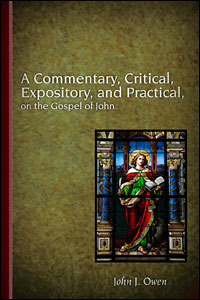
Providing thorough exposition on the Gospel of John, John J. Owen offers examination of the fourth gospel with regard to doctrinal and historical features in the text.
Dr. Owen has brought his great linguistic attainments to bear upon this work with great effect and success . . . it is to be ranked among the best contributions to exegetical literature our country has produced.
—The Methodist Review
John J. Owen (1803–1869) was educated at Andover Theological Seminary before being ordained into the Presbyterian Church. He went on to become Professor of Greek and Latin Language at New York Free Academy in 1849. Owen later became Vice-President of New York Free Academy in 1853 until his death.
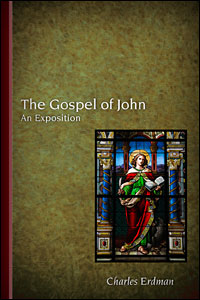
Providing exegetical studies on the last synoptic gospel, renowned author Charles R. Erdman provides succinct commentary that moves verse-by-verse through the text. Erdman intensely studies the prologue in order to draw conclusive results of the origin and authorship of the text.
The exposition is clear and practical . . . it will be found exceedingly helpful by all classes of readers of the gospel and teachers in Bible-school.
—The Homiletic Review
Charles R. Erdman (1866–1960) was educated at Princeton University and Princeton Theological Seminary. Erdman was ordained in 1891, and went on to become pastor of Overbrook Presbyterian Church in Philadelphia.
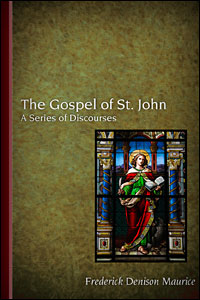
Offered as a series of twenty-eight discourses, Frederick Denison Maurice presents extensive studies based on the Greek and Latin translations. Seeking to resolve the differences between the two, Maurice examines Patristic material for historical evidence and context.
Thorough honesty, reverence, and deep thought pervade the work, which is every way solid and philosophical, as well as theological, and abounding with suggestions which the patient student may draw out more at length for himself.
—The Literary Churchman
Mr. Maurice's most effective and instructive work. He is peculiarly fitted by the constitution of his mind, to throw light on St. John's writings.
—National Review
Frederick Denison Maurice (1805–1872) was born at Normanston, Suffolk, and after obtaining a civil law degree and pursuing a career in the literary field, decided to seek Anglican ordination. In 1834 he was ordained and was appointed as Chaplain of Guy's Hospital. He authored numerous popular books, including The Kingdom of Christ, Moral and Metaphysical Philosophy, The Prophets and Kings of the Old Testament, and The Lord's Prayer, a Manual.
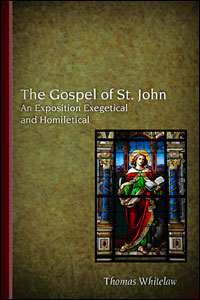
Examining the authenticity, structure, and content of the fourth Gospel, Thomas Whitlaw exegetically inquires into the witness of the Apostle John. Whitlaw takes into account the writings of the early Church Fathers, as well as those of Jewish historians, in order to provide a developed historical analysis.
Dr. Whitelaw discusses with marked ability, candor, and local acumen, the usual questions of the authenticity, authorship, composition, purpose, and plan of the Gospel. The exposition properly reflects on its every page untiring industry, grammatical scholarship, exegetical skill, sound judgment, and independence of thought.
—The Theological Monthly
Thomas Whitelaw was educated at the University of Aberdeen before becoming minister of King Street United Free Church in Kilmarnock, Scotland. Whitelaw received an honorary Doctorate of Divinity from St. Andrews University.
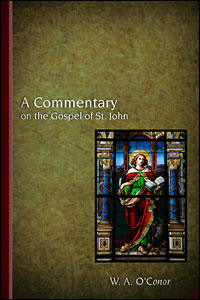
Dividing his commentary into sections reflecting each individual chapter of John, W. A. O'Conor examines the Gospel historically, semantically, and contextually. Offering interpretation of symbolic and colloquialistic use in the text, O'Conor strives to provide inherent meaning of the text.
This book is marked by lucidity, acuteness, conscientiousness, a wide range of learning, sound scholarship, and a fine and tolerant breadth of view.
—Manchester News
W. A. O'Conor (1820–1887) was educated at Trinity College, Dublin before becoming Curate of St. Michael's, Chester. O'Conor later became Lecturer of Latin at St. Adam's Theological College, Dublin and Rector of St. Simon and St. Jude, Manchester from 1858–1887.
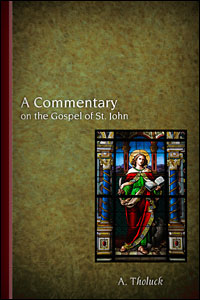
Examining the characteristics and language of the Gospel of John, A. Tholuck expresses critical interpretation on the foundation of Christian Theology. Examining the Greek and Syriac versions, Tholuck draws attention to key pieces in the text.
The commentary on John, though professedly exegetical in its character, contains much that appeals directly to the spiritual apprehension, but from communion "with the writer's own heart, and with the Spirit of God."
—Andover Biblical Repository
August Tholuck (1799–1877) was educated at the University of Breslau before becoming Professor of Theology at the University of Berlin. August Tholuck's many works include The Spirituality of German Awakening, Exposition of St. Paul's Epistles to the Romans, Light From the Cross, and Commentary on the Sermon on the Mount.
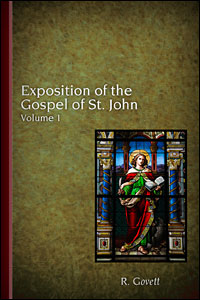
In volume one, Robert Govett expounds on the inherent purpose of the Gospel of John in context to the collective Synoptic Gospels. Seeking to clarify the historical context around when John's Gospel was scribed, Robert Govett examines the impacts of Gnosticism and Judaism on the church. Volume one covers chapters one through ten in the text.
Robert Govett (1813–1901) was educated at Worcester College, Oxford receiving both his Bachelors and Masters. Govett went on to become Vicar of Bexley, Kent and later at St. Stephens, Norwich. Govett's writings include Isaiah Unfulfilled, The Prophecy of Olivet or Matthew 24–25 Expounded, The Sermon on the Mount Expounded, and What is the Church: The Argument of Ephesians.
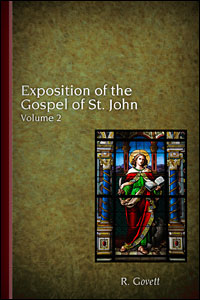
Picking up where volume one left off, volume two resumes at chapter eleven of the Gospel of John. Govett examines the text exegetically in historical and cultural context, while at the same time providing semantic discourse.
Robert Govett (1813–1901) was educated at Worcester College, Oxford receiving both his Bachelors and Masters. Govett went on to become Vicar of Bexley, Kent and later at St. Stephens, Norwich. Govett's writings include Isaiah Unfulfilled, The Prophecy of Olivet or Matthew 24–25 Expounded, The Sermon on the Mount Expounded, and What is the Church: The Argument of Ephesians.
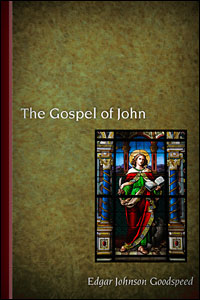
Discoursing on the composition, authorship, and place in the Synoptic Gospel, Edgar Johnson Goodspeed analyzes the significance of the Gospel of John. Providing historical context on the early church, Johnson highlights the different points of emphasis throughout the text.
Edgar Johnson Goodspeed (1871–1962) was educated at Denison University and the University of Chicago. Goodspeed went on to become Professor of Biblical Literature and Patristics at the University of Chicago in 1894. Goodspeed's works include The Twelve: The Story of Christ's Apostles, Problems of New Testament Translation, and The Apostolic Fathers: An American Translation.
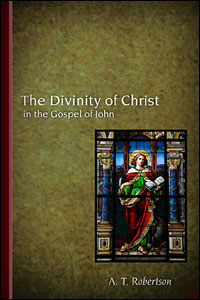
A. T. Robertson's The Divinity of Christ in the Gospel of John offers concise commentary on the birth of Jesus, the development of his ministry, and the vindication of the law. Seeking to also clarify authorship and purpose, Robertson provides an ample introduction to the text.
This volume can be laid alongside of Prof. Erdman's volume mentioned elsewhere, the two books being a fine furnishing of up-to-date and scholarly though writings. May such books be multiplied.
—Christian Thought
A. T. Robertson was born on November 6, 1863 in Chatham, Virginia, during the height of the Civil War. His family moved to Statesville, North Carolina, where he grew up. He was baptized in 1876 and immediately recognized God’s call to preach, and attended Wake Forest College.
Upon graduation in 1885, Robertson entered The Southern Baptist Theological Seminary, where he devoted himself to Greek studies under John Broadus. He was appointed Greek instructor as a student, and received his Th.M. in 1888. Robertson became an associate professor in 1890, and then served as Professor of New Testament Interpretation from 1895 to 1934. He devoted his life to preaching, teaching, scholarly activities, and giving public lectures, many of which have been reproduced in book form in this collection. He was a founding member of the Baptist World Alliance, and participated in numerous Bible conferences with Dwight Moody and F. B. Meyer.
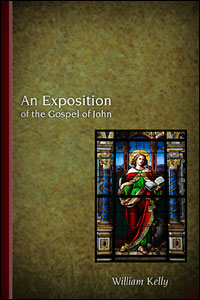
William Kelly, in his An Exposition of the Gospel of John, provides elucidation through exegesis, semantic analysis, and deductive reasoning. Giving rhetorical analysis of each verse, Kelly clarifies key points in the text.
William Kelly (1823–1906), born in Ireland, moved to London after attending Trinity College in Dublin. Becoming highly involved with the Plymouth Brethren, he also became a prolific writer, earning the respect of theologians such as Henry Alford. He is quoted as having said "There are three things real—the Cross, the enmity of the world, the love of God."
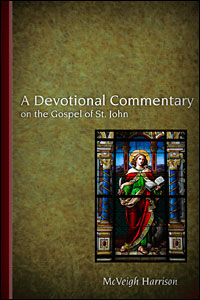
Arranged as a devotional—though exegetical in nature—McVeigh Harrison offers interpretation and commentary on each individual chapter found in the Gospel. McVeigh notes the structural differences between the Gospel of John and the rest of the Synoptic Gospels.
McVeigh Harrison, born in 1878, was author of Daily Meditation on the Christian Life, Saint Luke, His Life, Character and Teaching, and Common Sense About Religion.
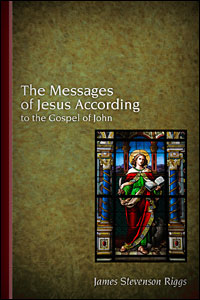
Subsequently after a lengthy introduction concerning the authorship and formation of the Gospel, James Stevenson Riggs explores the character, history, ministry, and exposition found in the text.
This book is convenient and attractive, pleasant to the hand and to the eye. It is pleasant to close with words of praise, and we heartily commend the volume of Prof. Riggs to all who desire a thorough, reverent, and sympathetic exposition of the Gospel.
—The Princeton Theological Review
James Stevenson Riggs (1853–1936) was educated at the College Of New Jersey, Princeton and Auburn Theological Seminary. Riggs then served as Adjunct Professor of Biblical Greek at Auburn Theological Seminary from 1884–1887.
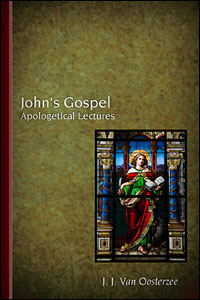
Originally arranged as a series of four apologetic lectures, J. J. van Oosterzee explores the authenticity, authorship, formation, and account of John's Gospel. Examining its relationship to the Synoptic Gospels, Oosterzee offers comprehensive analysis of the text.
Van Oosterzee is already known in America as one of the contributor's to Lange's Commentary. He is one of the most eloquent preachers and profound scholars of Holland, a little more than fifty years of age. The present volume is a course of lectures by him, delivered to a large and intelligent audience in the Odeo of Amsterdam with good effect.
—The Methodist Quarterly Review
The small volume before us is the production of a strong and cultivated mind . . . Nothing could be more able, seasonable, and complete.
—Watchmen
J. J. van Oosterzee, born in Holland in 1817, was educated at the University of Utrecht before becoming Professor of Theology at the University of Utrecht.
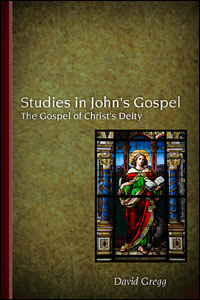
Discoursing on the primary objective of the Gospel of John, David Gregg explores the doctrines and didactic allegories held within the text. Seeking to provide explanation and elucidation of the material, Gregg draws upon historical sources in order to supplement his conclusions.
This volume will be especially helpful to students of the Gospel of John . . . it is a book of practical and suggestive sermons.
—Cumberland Presbyterian Review
These discourses are much above the average of sermons. They are broad and deep, they instruct and edify, while they hold and delight the reader. Dr. Gregg has distinguished himseld as an author, it is a valuable contribution tot he permanent religious literature.
—Christian Thought
David Gregg (born in 1846) was educated at Allegheney College, Jefferson College, and the Theological Seminary of Allegheny. Gregg later accepted the call of pastor at Lafayette Avenue Presbyterian Church in Brooklyn. He was bestowed with an honorary Doctorate of Divinity by the University of New York in 1888.
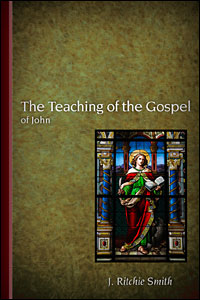
In The Teaching of the Gospel of John, Smith provides extensive analysis of themes found in the Gospel of John. Moving verse-by-verse, he provides clarification on authorship, structure, historical background, and rhetorical meaning.
It is a delight to receive such gifts from the pastorate as this excellent study of the teaching of John's Gospel. The reader will . . . find in it the admirably stated results of much careful and thoughtful exegetical study of John.
—The Princeton Theological Review
It seems to me an excellent piece of work, scholarly, instructive, clearly written, well arranged. It gives the essence of the religious teaching of St. John's Gospel in a lucid and orderly form, bringing out the main structural points of the Johannine Theology.
—Southern Methodist Review
J. Ritchie Smith was Minister of Market Square Presbyterian Church.
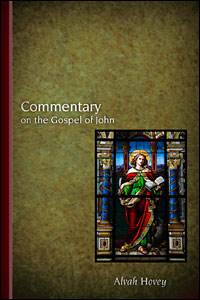
Articulating the distinctive characteristics of the Gospel of John, Alvah Hovey exegetically examines the text. Drawing upon notes from John A. Broadus for clarification in the margins, Hovey provides historical-critical method and inquiry into the text.
The scholarship of Dr. Hovey, the general editor . . . is a guarantee of the superior character and worth of the commentary as a whole.
—The Homiletic Review
Alvah Hovey (1820–1903) was born in Greene, New York and educated at Dartmouth College and Newton Theological Institution. He stayed at Newton as a librarian and professor of Hebrew, church history, theology, and Christian ethics. His numerous books include Life of St. Chrysostom, The State of the Impenitent Dead, and The Miracles of Christ as Attested by the Evangelists.
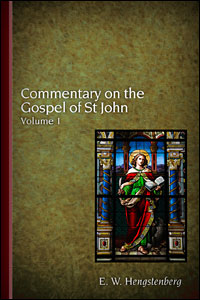
Offering extensive exposition of the Gospel of John, E. W. Hengstenberg moves verse-by-verse expounding on semantic inequalities, inherent meaning, and doctrinal purpose. Studying the character of Christ, Hengstenberg closely examines the theopneuestic nature of the text.
E. W. Hengstenberg (1802–1869) was educated at the University of Bonn before becoming Professor of Theological Philosophy at the University of Berlin. In 1827 Hengstenberg became the editor of Evangelische Kirckenzeitung, a German Journal intent on defending the Christian faith.
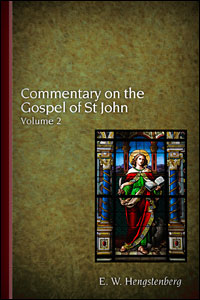
Offering extensive exposition of the Gospel of John, E. W. Hengstenberg moves verse-by-verse expounding on semantic inequalities, inherent meaning, and doctrinal purpose. Studying the character of Christ, Hengstenberg closely examines the theopneuestic nature of the text.
E. W. Hengstenberg (1802–1869) was educated at the University of Bonn before becoming Professor of Theological Philosophy at the University of Berlin. In 1827 Hengstenberg became the editor of Evangelische Kirckenzeitung, a German Journal intent on defending the Christian faith.
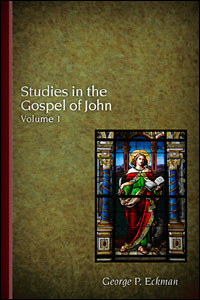
Expounding on the authorship, biography, character, and testimony of the Gospel, George P. Eckman examines each key event in the ministry of Jesus. Volume one covers chapters one through twelve of John.
In this volume we find a very helpful analytical, expository and devotional study of the first twelve chapters of the Gospel of John. All who get this volume will hope that the author will put forth soon another covering the remaining chapters of the gospel.
—The Pacific
George P. Eckman (1860) was educated at Wyoming Seminary College, Wesleyan University, Drew Theological Seminary, and Syracuse University. Eckman was Pastor of St. Paul's Methodist Episcopal Church, New York in the early twentieth century.
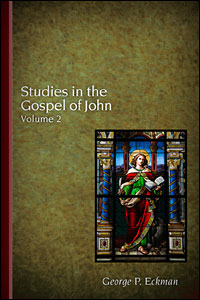
Expounding on the authorship, biography, character, and testimony of the Gospel, George P. Eckman examines each key event in the ministry of Jesus. Volume two covers chapters thirteen to twenty-one of John.
George P. Eckman (1860) was educated at Wyoming Seminary College, Wesleyan University, Drew Theological Seminary, and Syracuse University. Eckman was Pastor of St. Paul's Methodist Episcopal Church, New York in the early twentieth century.
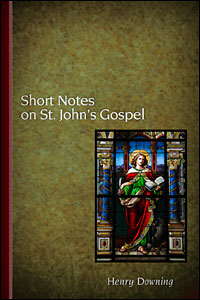
Seeking to clarify critical meaning in the text, Henry Downing offers extensive notes and annotation as a supplement to exegetical studies. This volume is useful as a tool to engage difficulties in the text that are otherwise left unclarified.
Henry Downing (1817–1871) was educated at Trinity College, Oxford before becoming Rector of Old Swinford.
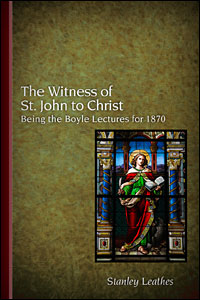
Arranged as a series of eight lectures, Stanley Leathes takes upon the task of establishing John as a credible witness. Leathes examines the characteristics and structure of the Gospel of John, while expounding on the essential doctrines held in the text.
The excellence of this volume for popular purposes is—that it dwells largely on what may be called the internal evidence of the gospel itself. Its literary characteristics—which prove that the writer meant it as a history; its spiritual significance' the inward witness of St. John, are all discussed, and discussed in a way which seems to us conclusive.
—The Lambeth Review
Stanley Leathes was Hebrew Lecturer at King's College, London.
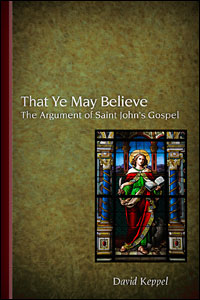
Offering succinct commentary on the Gospel of John, David Keppel walks the reader through the inherent objective of the Gospel. Keppel provides apologetic insight on the life and character of Christ.
David Keppel was Pastor of First Methodist Church of Elmira from 1896–1900. Keppel was ordained in 1868.
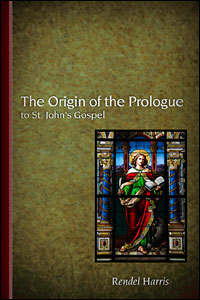
Focusing on the prologue of John's Gospel, J. Rendel Harris offers concise exposition of the text. Examining semantics and authorship, Harris compares the Greek, Latin, and Syriac translations.
J. Rendell Harris was educated at Clare, College Cambridge before becoming Professor of New Testament Greek at John Hopkins University. Harris went on to later become Professor of Theology at Leiden University.
Reviews
9 ratings

Forrest Cole
11/9/2021
www.godinvitesyou.com
6/21/2015

M. David Johnson
3/27/2015
Michael Maria Waldstein
12/7/2013

Larry Proffitt (I
11/13/2013

Pastor Bill Brown
11/9/2013
Eduardo Vega
9/25/2013

Caleb Allen
9/9/2013

Faithlife User
7/12/2013